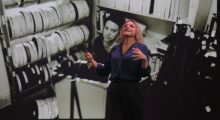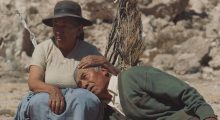17728 Results for “”
-
“The Silences, the Looks, Are What Mark the Emotional Rhythm”: Editor Fernando Epstein on Utama

Utama, the feature debut by Alejandro Loayza Grisi, concerns an elderly Quechua couple urged by their grandson to move to the city while their native land is ravaged by drought. The pace of life and the experience of time are major themes in the film, and editor Fernando Epstein discusses how this necessitated creative ways of depicting routine and delaying the introduction of a major character. Filmmaker: How and why did you wind up being the editor of your film? What were the factors and attributes that led to your being hired for this job? Epstein: I am Uruguayan, and […]
by Filmmaker Staff on Jan 22, 2022 -
“The Reason I Make Films Has Been Reinforced by the Pandemic” | Alejandro Loayza Grisi, Utama

The last two years have prompted much contemplation and reconsideration of the reasons why we make our films as well as the ways in which we make them. What aspect of your filmmaking—whether in your creative process, the way you finance your films, your production methodology or the way you relate to your audience—did you have to reinvent in order to make and complete the film you are bringing to the festival this year? Among all the ways people had to live during the pandemic, mine was undoubtedly one of the privileged ones, and I feel grateful for how lucky […]
by Filmmaker Staff on Jan 22, 2022 -
“In That Lack of Motion I Found a New Way of Working” | Sophie Hyde, Good Luck to You, Leo Grande

The last two years have prompted much contemplation and reconsideration of the reasons why we make our films as well as the ways in which we make them. What aspect of your filmmaking—whether in your creative process, the way you finance your films, your production methodology or the way you relate to your audience—did you have to reinvent in order to make and complete the film you are bringing to the festival this year? Being at home. I’ve always been based here on Kaurna land in Adelaide, South Australia. I have lived and worked from here my whole life. And […]
by Filmmaker Staff on Jan 22, 2022 -
“We Were Finding Ways to Make Daylight Beautiful and Intimate”: Editor Bryan Mason on Good Luck to You, Leo Grande



Sophie Hyde’s Good Luck to You, Leo Grande takes place largely in a hotel room, where a retired schoolteacher determined to finally have good sex meets with a sex worker several times over the course of six weeks. Cinematographer Bryan Mason discusses how he varied the film’s style as the two get to know each other and the difficulties associated with shooting a film about sex that takes place largely during the daytime. Filmmaker: How and why did you wind up being the cinematographer of your film? What were the factors and attributes that led to your being hired for this job? […]
by Filmmaker Staff on Jan 22, 2022 -
“The Visual Language of Cinema was Connected to Both Sexual Assault and Employment Discrimination” | Nina Menkes, Brainwashed: Sex-Camera-Power


The last two years have prompted much contemplation and reconsideration of the reasons why we make our films as well as the ways in which we make them. What aspect of your filmmaking—whether in your creative process, the way you finance your films, your production methodology or the way you relate to your audience—did you have to reinvent in order to make and complete the film you are bringing to the festival this year? Those people who are familiar with my work know that my films have always come to me from the inside. Images appear before my mind’s eye […]
by Filmmaker Staff on Jan 22, 2022 -
“Everyone Has a Unique Perspective on the World”: DP Shana Hagan on Brainwashed: Sex-Camera-Power


Based on her own cinematic talk, Nina Menkes’ Brainwashed: Sex-Camera-Power uses interviews, footage of her talk, and clips from over 175 films to help illustrate how sexual assault and employment discrimination are inscribed in the visual language of cinema. Below, cinematographer Shana Hagan discusses the challenges in adequately capturing the talk on camera, the importance of color grading, and the joys of working with so many women on set. Filmmaker: How and why did you wind up being the cinematographer of your film? What were the factors and attributes that led to your being hired for this job? Hagan: I was introduced […]
by Filmmaker Staff on Jan 22, 2022 -
“This Film Feels Like My Life’s Work Until Now” | Margaret Brown, Descendant



The last two years have prompted much contemplation and reconsideration of the reasons why we make our films as well as the ways in which we make them. What aspect of your filmmaking—whether in your creative process, the way you finance your films, your production methodology or the way you relate to your audience—did you have to reinvent in order to make and complete the film you are bringing to the festival this year? From the beginning, the story of the Africatown community did not feel like mine to try to tell. Fascinations with the Old South, and ghosts and […]
by Filmmaker Staff on Jan 22, 2022 -
“Find the Story Only You Can Tell and Make It on the Scale You Can Make It” | Lena Dunham, Sharp Stick


The last two years have prompted much contemplation and reconsideration of the reasons why we make our films as well as the ways in which we make them. What aspect of your filmmaking—whether in your creative process, the way you finance your films, your production methodology or the way you relate to your audience—did you have to reinvent in order to make and complete the film you are bringing to the festival this year? In March 2020, I was just a few weeks out from production on my first film in 10 years and my first studio film. When it […]
by Filmmaker Staff on Jan 22, 2022 -
“What’s Exciting About Spending a Lot of Time With Footage Is Always the Patterns That Begin to Emerge”: Editors Geoffrey Richman and Michael Bloch on Descendant



The 2019 discovery of the Clotilda, the last known slave ship to enter the United States, was the impetus for Descendant, but the film is as much about the contemporary residents of Africatown, the community just north of Mobile, Alabama founded by the slaves aboard the Clotilda. The film’s editors explain why they did not want to introduce the discovery of the ship too early, how Zora Neale Thurston helped shape the film, and how seemingly disparate elements gradually formed connections. Filmmaker: How and why did you wind up being the editor of your film? What were the factors and attributes […]
by Filmmaker Staff on Jan 22, 2022 -
“In Every Situation We Were There as Persons—Persons That Happened to Have Cameras With Us”: DPs Love Martinsen & Maria Loohufvud on Calendar Girls


Calendar Girls takes its name from its subject, a Florida dance troupe consisting of women over 60 who perform at animal rescue center benefits, church fundraisers and local parades with unbounded and contagious enthusiasm. Below, Love Martinsen and Maria Loohufvud discuss how their intent in capturing the troupe informed their approach and how they managed to make the film on a shoestring budget. Filmmaker: How and why did you wind up being the cinematographer of your film? What were the factors and attributes that led to your being hired for this job? Loohufvid & Martinsen: This film is all about DIY. […]
by Filmmaker Staff on Jan 22, 2022


